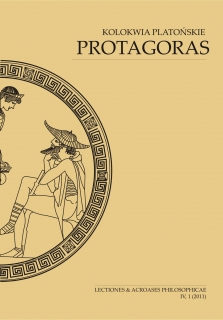Postaci wiedzy w platońskim Protagorasie
Słowa kluczowe:
Platon, Protagoras, wiedzaAbstrakt
<p><strong>Concepts of knowledge in Plato's <em>Protagoras</em></strong></p><p> </p><p>In Plato's philosophy the concept of knowledge plays an outstanding role. This contribution will show that Plato focused on this topic already in his early dialogue Protagoras. In particular the discussion about the sophistic concepts of knowledge forms the thread of this dialogue. In its first part Socrates examines the common prejudices about sophistic knowledge. His phenomenology of learning a process of 'getting wiser' points out that knowledge is always the knowledge of something. The substance of knowledge the mathēma can be isolated from individual persons knowing something. Socrates underlines that human psyche feeds on mathēmata. Therefore, it is of vital importance to distinguish useful knowledge from harmful knowledge. The second - more comprehensive - part of the Protagoras offers a critical synopsis of types of sophistical knowledge. In particular, the concepts of polumathiē, of rhetorical skills, of poetological language competence and of political knowledge are discussed. In the third and final part of the dialogue Plato presents his own concept of knowledge, named ''the art of measuring''. This metretikē technē is a type of practical knowledge relating decisions based on momentary phenomena to the consequences of future actions. This kind of knowledge aims at insights preventing our loss of ethical intuitions, which in principle we have at our disposal.</p>Opublikowane
30-06-2011
Numer
Dział
Artykuły [1043]

